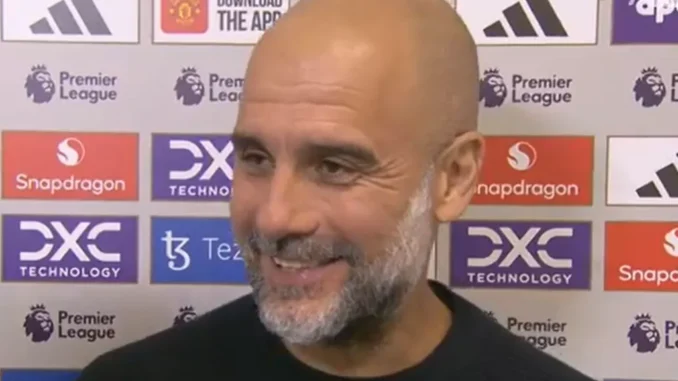
In the simmering cauldron of Old Trafford, where rivalries burn eternal, Manchester City’s Pep Guardiola found himself in a rare playful mood despite a frustrating stalemate against Manchester United. The Premier League clash on a tense Sunday afternoon ended in a goalless draw, a result that left both sides with a point but little to celebrate. For Guardiola, the reigning champion manager whose tactical brilliance has redefined English football, the post-match spotlight turned into an unexpected stage for banter rather than brooding analysis. Facing a persistent Sky Sports reporter, Guardiola didn’t just deflect questions—he lobbed a cheeky suggestion that’s now making waves across the football world.
The match itself was a gritty affair, a far cry from the free-flowing spectacles City fans have grown accustomed to under Guardiola’s reign. With both teams locked in a tactical chess match, scoring chances were scarce, and the final whistle confirmed a 0-0 deadlock. Manchester United, under their new boss Rúben Amorim, leaned heavily on their transitional strengths, threatening to punish City on the break. Meanwhile, Guardiola’s side, hampered by a cautious approach and a makeshift backline, couldn’t quite find the rhythm to unlock their rivals’ defense. It was a game that showcased resilience over flair, leaving the Spaniard with plenty to ponder as City’s title defense faces mounting scrutiny.
After the whistle, Guardiola stepped into the interview zone, where Sky Sports’ Patrick Davidson awaited with probing questions. The reporter, eager to dissect City’s inability to break down United, pressed the manager for insights. “How could you have hurt them more?” Davidson asked, a question that seemed to tickle Guardiola’s dry wit. “The players know this,” came the curt reply, a classic Guardiola move to keep his cards close. Undeterred, Davidson pushed again: “Can you share it with us? The game is gone now…” That’s when the City boss, with a glint in his eye, turned the tables. “You should know, after nine years together,” he quipped, before delivering the zinger: “You should work in business maybe? And then ask about football.”
The exchange, dripping with Guardiola’s trademark blend of sarcasm and charm, left Davidson momentarily stumped but smiling. It was a lighthearted jab, a suggestion that perhaps the reporter’s knack for interrogation might be better suited to a boardroom than a press gantry. Yet, beneath the jest, Guardiola offered a sliver of insight into the match. “They [the players] know it. The process. If the ball is on one side, the players have to be in the right position. Today was not enough good,” he admitted, acknowledging that City’s execution fell short. He also tipped his hat to United’s counterattacking threat, noting, “When we lose the ball, they are a strong team; they punish you on the transition and we know that.”
This wasn’t Guardiola dodging accountability—he rarely does. Instead, it was a glimpse into the mind of a manager who’s spent nearly a decade molding Manchester City into a juggernaut, only to find himself wrestling with a season of unexpected turbulence. With injuries piling up and key players like Rodri sidelined, City’s once-invincible aura has taken a hit. The draw at Old Trafford, while not a defeat, underscored the fine margins that could define their campaign. Guardiola’s playful deflection might’ve been a way to sidestep the pressure, but his words carried weight: the process, the positioning, the precision—it all needs sharpening.
For United, the result marked a small victory in Amorim’s early tenure, a sign that his “transitional” team, as Guardiola dubbed them, could hold their own against the best. The Portuguese manager’s ambition to refine United’s build-up play is a work in progress, but their resilience offered hope to a fanbase craving resurgence. As for Guardiola, the banter with Davidson was a momentary reprieve from the grind. With a blockbuster April ahead—facing Real Madrid twice in the Champions League and a Premier League gauntlet including Liverpool and Tottenham—he’ll need more than wit to keep City’s season on track. For now, though, the image of a grinning Guardiola suggesting a career change for a reporter is the spark of levity in a campaign growing ever more serious.
Leave a Reply